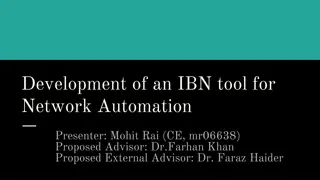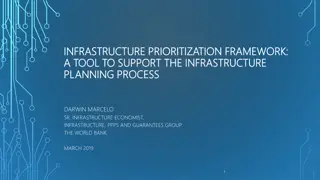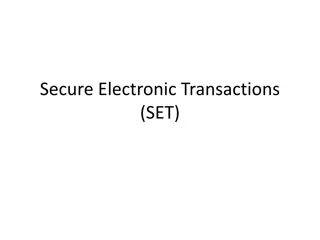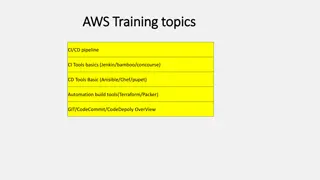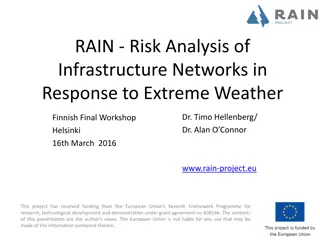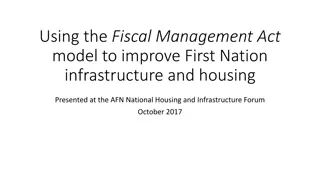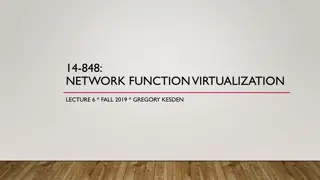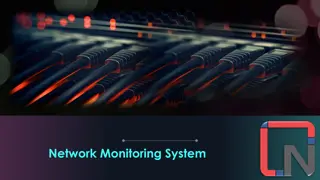Secure Network Infrastructure Best Practices
Implementing secure network infrastructure practices is crucial to safeguard sensitive data and ensure operational efficiency. This includes utilizing VPNs, VLANs, dedicated circuits, and other technologies to protect against cyber threats. Segregating wireless and wired networks, implementing VoIP securely, and following industry guidelines are essential steps in maintaining a robust network environment.
Download Presentation

Please find below an Image/Link to download the presentation.
The content on the website is provided AS IS for your information and personal use only. It may not be sold, licensed, or shared on other websites without obtaining consent from the author.If you encounter any issues during the download, it is possible that the publisher has removed the file from their server.
You are allowed to download the files provided on this website for personal or commercial use, subject to the condition that they are used lawfully. All files are the property of their respective owners.
The content on the website is provided AS IS for your information and personal use only. It may not be sold, licensed, or shared on other websites without obtaining consent from the author.
E N D
Presentation Transcript
FIPS.gif (Dedicated Circuits) VPN to Municipalities via Internet See Figure C-1-D in CJIS Policy Other WWW CSA Municipalities Remote Admin? FIPS.gif Other Relationships: Fiber to other Facilities SAN Storage (CJI ?) Regional Provider (CSA approved) Internet Router Intrusion FIPS.gif Detection Extranet AA Server Router/Firewall/VPN CAD System (CJI) 128-bit TLS LE Non-LE VLAN (see following slide) VLANs CAD Client w/AA TLS Web App. hosted by State with AA See following slide for more examples Other Department workstations/Local 802.11X LAN CAD Clients TLS Web App. hosted by State
(Dedicated Circuits) VPN to Municipalities via Internet (See Figure C-1-D in CJIS Policy) Other WWW CSA FIPS.gif Municipalities Remote Admin? FIPS.gif Other Relationships: Fiber to other Facilities SAN Storage (CJI ?) Regional Provider (CSA approved) CISCO 2800 IOS v6.1 IBM FIPS.gif Proventia CISCO 2800/v6.1 CISCO ASA 5505 AA Server (RSA) RMS System (CJI) TriTech Perform Netmotion Mobility XE CAD System (CJI) Tritech Perform 128-bit TLS LE Non-LE VLAN (see following slide) VLANs CAD Client w/AA (RSA) TLS Web App. hosted by State with AA See following slide for more examples Other Department workstations/Local 802.11X LAN (if 802.11X used for CJI see CJIS Policy 5.5.7) CAD Clients TLS Web App. hosted by State (Name of State System)
VLANS 5.5.7.1 All 802.11x Wireless Protocols physically (e.g. firewalls), the wireless network from the operational wired infrastructure. Limit access between wireless networks and the wired network to only operational needs. Segregate, virtually (e.g. virtual local area network (VLAN) and ACLs) or 5.10.1.4 Voice over Internet Protocol (IP) services.Among VoIP s risks that have to be considered carefully are: myriad security concerns, cost issues associated with new networking hardware requirements, and overarching quality of service (QoS) factors. In addition to the security controls described in this document, the following additional controls shall be implemented when an agency deploys VoIP within a network that contains unencrypted CJI: 1. Establish usage restrictions and implementation guidance for VoIP technologies. 2. Change the default administrative password on the IP phones and VoIP switches. 3. Utilize Virtual Local Area Network (VLAN) technology to segment VoIP traffic from data traffic. VoIP can be installed in-line with an organization s existing Internet Protocol
Source: http://discover.netmotionwireless.com/rs/netmotionwireless/images/NetMotion-Wireless_Security-Wireless-Networks_WP.pdf
Source: http://discover.netmotionwireless.com/rs/netmotionwireless/images/NetMotion-Wireless_Security-Wireless-Networks_WP.pdf






